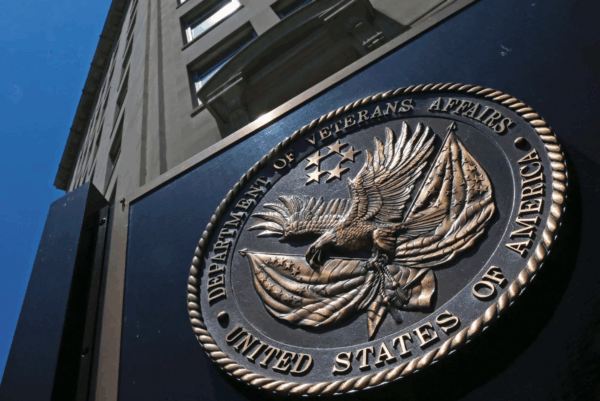
Seal on the Department of Veterans Affairs’s building, Washington D.C. (Photo: Charles Dharapak/AP)
Officials at the VA have acknowledged the need for private workspaces for telehealth therapy sessions, following strong pushback from clinicians and lawmakers. A memo dated April 12, obtained by NPR, states that mental health providers must have access to private environments that support confidential, therapeutic relationships with Veterans.
The statement comes in response to growing concerns from VA clinicians who currently provide telehealth services from home. Under a new return-to-office directive, many of these providers are being required to report to VA facilities by May 5. However, clinicians have warned that many of these facilities lack adequate private space to conduct sensitive therapy sessions, raising potential violations of federal confidentiality laws.
The April 12 memo followed media reports and increased scrutiny from lawmakers regarding the implications of the return-to-office order. Prior to the memo, VA management in one region distributed a script instructing therapists to inform patients that complete confidentiality could not be guaranteed due to shared office environments. This sparked further concern among providers and Veterans’ advocates.
According to the memo, telehealth sessions must be conducted in settings that match the privacy standards of in-person appointments. Despite this clarification, many clinicians remain confused about whether they will be allowed to continue working remotely if private space is not available at VA facilities. Several have reported issues such as overcrowded offices, limited parking, and a lack of designated therapy rooms.
A separate document reviewed by NPR suggests that mental health providers could be eligible for exemptions from the in-person requirement, though it offers few specifics. Meanwhile, some VA staff were required to return to offices on April 14, while others have experienced last-minute changes to their reporting dates.
The American Psychological Association has also weighed in, criticizing the return-to-office policy. The organization raised concerns that therapists could be forced to choose between violating privacy standards and facing disciplinary action. “That’s just such a fundamental way that psychological services and psychotherapy has been conducted,” Dr. Lynn Bufka, head of practice at the APA, told NPR.
VA officials have defended the policy, insisting that all facilities will comply with federal laws and that appropriate accommodations will be made. VA spokesperson Peter Kasperowicz has described criticism of the return-to-office mandate as “fear-mongering” and stated that the policy would not disrupt Veterans’ care.
Still, many providers say they see no clear way to meet both the return-to-office mandate and federal privacy requirements. Some have considered conducting sessions from their cars or bathrooms to protect patient confidentiality. Others fear longer wait times and reduced access to care, especially for Veterans experiencing severe mental health challenges.
As the VA moves forward with its return-to-office plan, concerns remain about how it will uphold the privacy and quality of care for Veterans.